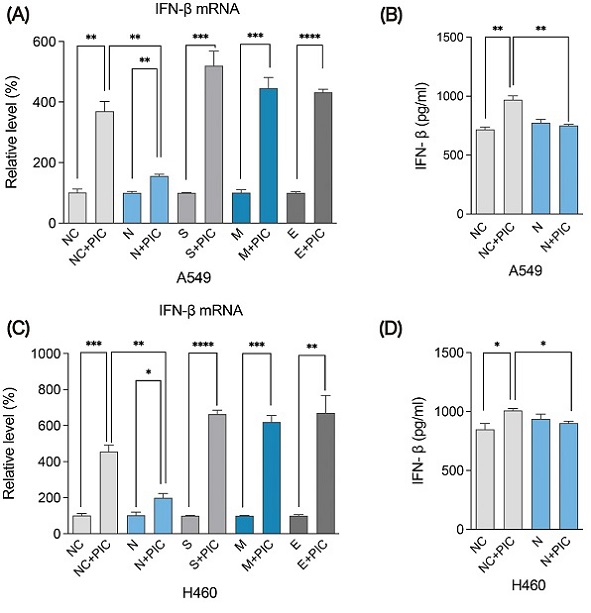SARS-CoV-2 Suppresses IFN-β Induction Via N Protein-Dependent LINC01002-miR-4324-FRMD8 Axis
Nkhil Prasad Fact checked by:Thailand Medical News Team May 13, 2024 1 year, 9 months, 3 days, 7 hours, 3 minutes ago
COVID-19 News: The emergence of COVID-19, caused by the severe acute respiratory syndrome coronavirus-2 (SARS-CoV-2), has not only challenged global healthcare systems but also spurred intense scientific scrutiny into the virus's mechanisms of immune evasion. As researchers delve deeper into understanding how SARS-CoV-2 evades host immune defenses, a recent study from the Eighth Affiliated Hospital at Sun Yat-sen University in Shenzhen, China that is covered in this
COVID-19 News report, sheds crucial light on a novel pathway involving the N protein-dependent LINC01002-miR-4324-FRMD8 axis that suppresses interferon-beta (IFN-β) induction.
 Effect of SARS-CoV-2 encoded proteins on the induction of IFN-β. Data are presented as means ± SD of three independent experiments. The mRNA expression of IFN-β in A549 cells (A) and H460 cells (C) with SARS-CoV-2 encoded proteins transfection and PIC treatment. ELISA was used to assess the induction level of IFN-β in A549 cells (B) and H460 cells (D) after treatment with N protein and PIC.
The Complexities of COVID-19: From Symptoms to Severe Complications
Effect of SARS-CoV-2 encoded proteins on the induction of IFN-β. Data are presented as means ± SD of three independent experiments. The mRNA expression of IFN-β in A549 cells (A) and H460 cells (C) with SARS-CoV-2 encoded proteins transfection and PIC treatment. ELISA was used to assess the induction level of IFN-β in A549 cells (B) and H460 cells (D) after treatment with N protein and PIC.
The Complexities of COVID-19: From Symptoms to Severe Complications
COVID-19 patients typically present with pneumonia-associated symptoms initially, which can progress to life-threatening complications such as acute respiratory distress syndrome (ARDS), thromboinflammation, multiple organ dysfunction syndrome (MODS), and even death. This disease progression underscores the intricate dynamics between the virus and the host immune response, highlighting the need for a deeper understanding of SARS-CoV-2's immune evasion strategies.
The Viral Arsenal: Structural and Non-Structural Proteins
SARS-CoV-2, with its 30 kb positive-sense, single-stranded RNA genome, encodes a plethora of proteins crucial for its replication and immune evasion. While non-structural proteins (NSPs) and accessory proteins have garnered significant attention for their roles in suppressing type I interferon (IFN) responses, the contribution of structural proteins like Nucleocapsid (N), Spike (S), Membrane (M), and Envelope (E) proteins in immune evasion remains a focal point of investigation.
Exploring N Protein's Immune Modulation
The study conducted at the Eighth Affiliated Hospital meticulously investigated the impact of SARS-CoV-2's structural proteins on IFN-β induction. Through rigorous experimentation utilizing human alveolar epithelial cells, it was discovered that the N protein exhibited a pronounced inhibitory effect on IFN-β induction compared to other structural proteins. This finding not only underscores the significance of N protein in viral immune evasion but also prompts further exploration into the molecular mechanisms underlying this phenomenon.
>Decoding Molecular Mechanisms: RNA-Seq and Differential Gene Analysis
To unravel the intricate molecular pathways involved, the researchers employed cutting-edge techniques such as RNA-sequencing (RNA-Seq) and differential gene analysis. This comprehensive approach identified a robust set of 858 genes associated with N protein-mediated inhibition of IFN induction. Furthermore, the construction of a competitive endogenous RNA (ceRNA) network involving LINC01002, miR-4324, and FRMD8 shed light on the intricate regulatory mechanisms governing IFN-β expression during SARS-CoV-2 infection.
Validation through Single-Cell Sequencing
The study didn’t stop at identifying the ceRNA network but extended its validation through single-cell sequencing data. This integration provided further credence to the regulatory role of the LINC01002-miR-4324-FRMD8 axis in the IFN-dominated immune evasion induced by SARS-CoV-2. Such validation underscores the reliability and relevance of the identified ceRNA axis in the context of COVID-19 pathogenesis.
Elucidating CeRNA Axis Functionality
Experimental validation further elucidated the functional dynamics of the identified ceRNA axis. It was confirmed that N protein regulates IFN-β induction through the LINC01002-miR-4324-FRMD8 axis, showcasing the intricate interplay between these molecules. Knockdown experiments provided additional insights into how N protein suppresses IFN-β production via ceRNA-mediated mechanisms, highlighting the complexity of SARS-CoV-2's immune modulation strategies.
Implications for Therapeutic Interventions: Targeting the CeRNA Axis
Understanding these intricate molecular mechanisms opens avenues for novel therapeutic interventions. Targeting the N protein-dependent ceRNA axis could serve as a promising strategy for early intervention in the IFN-dominated immune evasion induced by SARS-CoV-2. This not only mitigates severe inflammatory responses but also offers a potential roadmap for developing targeted therapies to combat COVID-19.
Future Directions and Clinical Implications
While this study provides valuable insights into SARS-CoV-2 immune evasion, further research using animal models and clinical studies is warranted. Translating these findings into clinical practice could revolutionize COVID-19 treatment strategies, offering hope in the battle against this global pandemic. Moreover, exploring the therapeutic potential of targeting the identified ceRNA axis in preclinical and clinical settings holds immense promise for future antiviral interventions.
Conclusion
In conclusion, the study from the Eighth Affiliated Hospital at Sun Yat-sen University elucidates a novel pathway involving the N protein-dependent LINC01002-miR-4324-FRMD8 axis that modulates IFN-β induction during SARS-CoV-2 infection. This groundbreaking research not only expands our understanding of viral immune evasion mechanisms but also lays the groundwork for targeted therapeutic interventions aimed at mitigating severe inflammatory responses and improving clinical outcomes in COVID-19 patients.
The study findings were published in the peer reviewed Virology Journal
https://virologyj.biomedcentral.com/articles/10.1186/s12985-024-02382-2
For the latest COVID-19 News, keep on logging in to Thailand Medical News.
